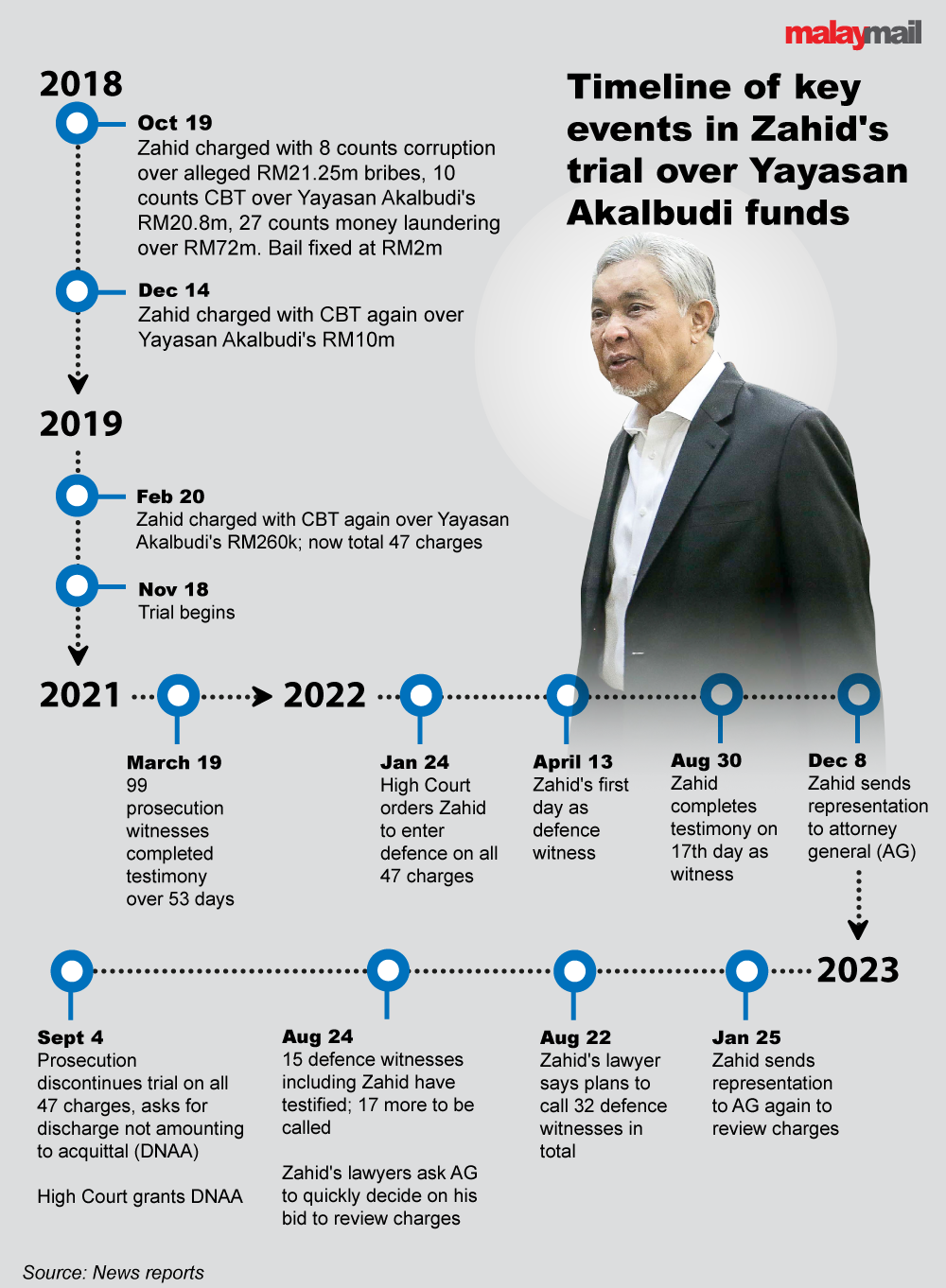KUALA LUMPUR, Sept 7 — The Malaysian Bar said today that the Attorney General’s Chambers’ (AGC) media statement on Tuesday to explain Deputy Prime Minister Datuk Seri Ahmad Zahid Hamidi’s dropped trial “rings hollow” or was insincere, as it did not explain the attorney general’s decision to withdraw all 47 charges but highlighted the court’s role instead.
Malaysian Bar president Karen Cheah Yee Lynn said it was the prosecution who had withdrawn all 47 charges against Zahid and that it was the prosecution who had asked the High Court on Monday to grant a discharge not amounting to acquittal (DNAA) on Zahid, with the prosecution alluding to the need for the Malaysian Anti-Corruption Commission (MACC) to carry out further investigations.
“The recent media statement issued by the AGC dated 5 September 2023 (“Media Statement”) was completely devoid of proper justifications as regards why it had requested for a DNAA,” Cheah said in the statement issued late tonight.
Following the prosecution’s withdrawal of all 47 charges against Zahid, Cheah stressed that the High Court could only decide between a DNAA or acquittal for Zahid.
“Let us be clear and make no mistake about it: the learned High Court Judge had no alternative but to decide on either a DNAA or an acquittal.
The Malaysian Bar claimed that the AGC had “tarnished its own reputation and credibility” as the prosecution and the MACC’s reputation as the investigating body, when the AGC applied for a DNAA in Zahid’s trial at such a late stage, which is where the prosecution had previously already succeeded in proving a prima facie case.
(A prima facie case is where the prosecution has successfully made out a case in which the accused has to answer to avoid being found guilty. In Zahid’s case, the prosecution had proven a prima facie case after calling in 99 prosecution witnesses, while 15 defence witnesses including Zahid had testified and 17 defence witnesses were yet to be called.)
“It therefore rings hollow for the AGC to wholly attribute the withdrawal of the case to the High Court and use that as a reason in the Media Statement, instead of providing a detailed explanation,” she said.
In the AGC’s brief two-paragraph statement on Tuesday, it did not say why the prosecution had decided to withdraw the 47 charges and to discontinue the ongoing trial against Zahid.
The AGC’s Tuesday statement had instead highlighted that the High Court had said the prosecution had given “cogent” reasons when the High Court decided to grant a DNAA.
Today, Cheah noted the High Court had in Zahid’s case said much precious court time and much taxpayers’ money would have been wasted if the prosecution decides not to proceed any further with the charges.
“On this note, the Malaysian Bar stresses that the AG must take responsibility and be accountable to the citizens of the country; and should the prosecution decide in the near future to proceed with any further charges, then it should avail itself of the process of ‘reinstatement of trial after discharge’ under section 254A of the Criminal Procedure Code, under which Zahid Hamidi’s trial shall be reinstated and continued as if no such DNAA order had been given,” she said.
Cheah said there had been high-profile cases in recent years where the AGC had dropped criminal charges against certain politicians amid trial, reportedly following representations or instructions. She noted these cases were high-profile as “they hold national and public interests primarily due to the substantial sums of money allegedly misappropriated by those individuals in positions of power and authority”.
The Malaysian Bar also expressed hope that “good sense and justice will prevail” and that the “unhealthy trend” of dropping charges will not continue on, highlighting cases such as ongoing trials involving former prime minister Datuk Seri Najib Razak such as the 1Malaysia Development Berhad (1MDB) case and his wife Datin Seri Rosmah Mansor’s second corruption case involving alleged money laundering and failure to declare her income tax.
Cheah said there must be “real political will” to separate the two roles of the AG and the public prosecutor — which is currently carried out by the AG — to enable true independence in prosecutorial powers free from any influence of the executive branch of government.
“The AG can take its advisory role to the government, but the Public Prosecutor acts as the guardian of public interest and must fulfil its functions and duties entrusted with utmost integrity, free from political influence and bias, to maintain public confidence in the Malaysian criminal justice system,” she said.
The Malaysian Bar said the federal government had in August 2023 said it would undertake a comprehensive empirical study within a year before finalising the proposed separation of the AG’s Office from the Public Prosecutor’s Office.
The Malaysian Bar said Zahid’s case has shown the increasing urgency for changes to take place by 2024 to ensure Malaysia’s criminal justice system is strengthened to remove the potential of bias or perception of bias in the way politicians are charged and in the way charges against politicians are withdrawn.























